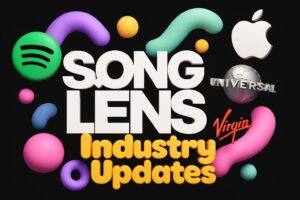REDRAWING THE MUSICAL LANDSCAPE: INNOVATION AND ADAPTATION IN MUSIC TECHNOLOGY
The music-tech landscape is witnessing a dynamic transformation, highlighted by significant shifts in AI, licensing, and platform strategies. Platforms like TikTok and YouTube are at the forefront of these changes, redefining the contours of music consumption and distribution. This week, the influence of virtual performers, strategic platform adaptations, and evolving legal frameworks are significantly impacting industry practices, marking a period of remarkable disruption and reinvention.
Netflix’s latest venture into animation with KPop Demon Hunters underscores virtual artists’ growing presence in the industry. Fictional K-pop groups Huntr/x and the Saja Boys have achieved unprecedented success, with tracks like “Your Idol” and “Golden” topping Spotify charts and competing with real-world giants like BTS and Blackpink. Their achievements highlight the transformative potential of virtual entities in reshaping music trends and driving streaming numbers, positioning virtual artists as formidable players in the digital music space.
Concurrently, TikTok is strategically aligning itself with U.S. regulations amid ongoing sale negotiations. By developing a U.S.-specific version of its app, TikTok is striving to ensure compliance and continuous service amidst geopolitical tensions. This move signals a broader trend where platforms must navigate complex regulatory landscapes while maintaining service continuity and user engagement in key markets.
Meanwhile, recent court rulings in favor of AI companies like Anthropic and Meta are sparking uncertainty within the music industry. These decisions, although beneficial to AI development, lack clarity in the context of music, where licensing represents a distinct challenge. As music publishers redefine their strategies with potential “no-train” clauses, the debate over AI’s role in music continues, emphasizing the need for clear guidelines to safeguard creators’ rights.
YouTube’s decision to tighten monetization rules from July 2025 further illustrates the industry’s shifting dynamics. By targeting AI-generated content lacking in originality, YouTube is championing content quality and rewarding creators who innovate with authenticity. This adjustment underscores a commitment to maintaining high standards and optimizing monetization frameworks to reflect evolving creative practices.
In this climate of transformation, independent labels are also realigning strategically. Hopeless Records’ acquisition of Fat Wreck Chords’ catalog marks a significant punk legacy alliance, reinforcing the importance of preserving musical heritage while expanding repertoire in niche genres. As the industry continues to navigate these uncharted territories, emerging collaborations and evolving platform policies underscore the need for adaptability, foresight, and innovation in shaping the future of music. Through such initiatives, the music industry is not only surviving disruption but actively thriving amid reinvention.



